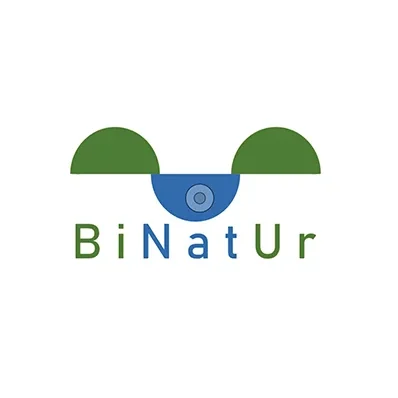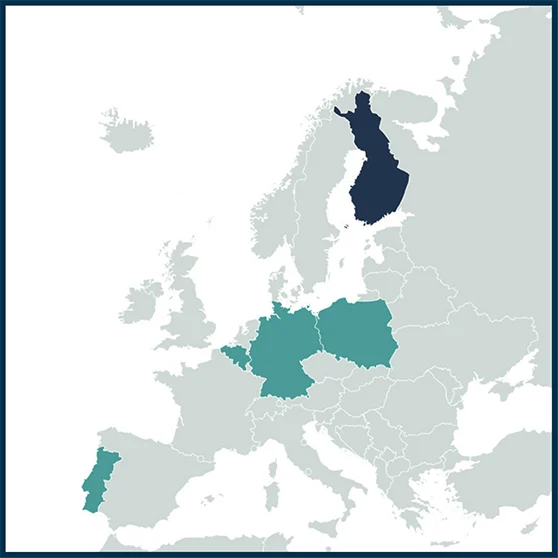
01.03.2022 – 31.03.2025
€ 1,246,023
Kati VIERIKKO
kati.vierikko@syke.fi
Coordinator: Environmental Policy, Finnish Environment Institute, Helsinki, Finland
Ecosystem Management, University of Antwerp (UAntwerp), Antwerp, Belgium
Geography, Humboldt University of Berlin (UFZ), Berlin, Germany
Ecohydrology, Leibniz Institute of Freshwater Ecology and Inland Fisheries (IGB), Berlin, Germany
Ecology and Environment Protection, Poznań University of Life Sciences (PULS), Poznań, Poland
Ecology, Evolution and Environmental Changes, University of Lisbon, Portugal

Climate change has dramatic consequences for the quantity, quality, and seasonal distribution of water. One result being the increased flash-flooding and soil erosion in urban areas. Nature-based solutions (NBS) aim to protect, sustainably manage, and enhance biodiversity and the delivery of ecosystem services, while also incorporating societal needs and challenges. Water-based NBS (“aquaNBS”) are implemented in many European cities and it is assumed that aquaNBS (e.g. ponds, streams) provide multiple ecosystem services and enhance local biodiversity. However, knowledge of their biodiversity and their links to ecosystem services provision in cities is limited.
BiNatUr will quantify the role of biodiversity and its linkages with ecosystem services in urban aquaNBS, with an overall aim of improve the planning, building, restoration, and management of aquaNBS. To this aim, a holistic approach to analyse the interactions between social, ecological and technological factors of aquaNBS at three spatial scales in five European cities will be used. The study sites encompass the European climatic gradient from Mediterranean to boreal regions, enabling the transfer of solutions among regions.
BiNatUr research focuses on four questions: (1) How are biodiversity and ecosystem services of aquaNBS mediated by social, ecological, and technological factors, (2) how do factors vary among cities and regions?, (3) how does biodiversity influence regulating ecosystem services provided by aquaNBS?, and (4) how can urban planning effectively design, manage, and monitor biodiversity and ES of aquaNBS? BiNatUr adopts a mixed-method approach by combining qualitative and quantitative research methods. The project focuses on the social possibilities and constraints, working at the city scale to study the decisions made when planning, designing and managing aquaNBS. In addition, BiNatUr will analyze landscape patterns of urban environments in order to identify critical social, ecological, and technological factors influencing biodiversity and ecosystem services of aquaNBS. The project will also conduct place-based studies and analyse the biodiversity and regulation of ecosystem services of the selected 12 aquaNBS in five case areas (Antwerp, Berlin, Helsinki, Lissabon and Poznań).
Restoring habitats in urban areas is critical to provide key ecosystem services, especially under the effects of global climate change. BiNatUr brings new scientific evidence on the role of urban water-related NBS to support ecosystem services and linkages between biodiversity. A previous EU Biodiversa project (BioVeins) identified aquatic habitats in cities as the ones more understudied and also with more potential to provide a wide range of conditions for urban biodiversity and ecosystem services. BiNatUr will build on that knowledge to provide guidelines on how to implement these improvements, taking into consideration the holistic approach provided by the social, ecological and technical systems framework. The cities chosen for BiNatUr are largely representative of the European climate and provide a unique opportunity to quantify the effects of the conditions of this framework on aquaNBS biodiversity and ecosystem services. BiNatUr will model results at the city scale and at the continental scale, highlighting the value of European-wide collaboration. By studying cities in representative climatic regions, BiNatUr will provide solutions that may become important in the future under climate change. This south-to-north transfer of knowledge may also result in the adoption of solutions that have been shown to work in southern locations by the northern partners of BiNatUr.
BiNatUr will support the Urban Greening targets of European Biodiversity Strategy for 2030 by providing new information about ecological conditions, biodiversity values and ecosystem services provision of aquaNBS. BiNatUr is also closely linked to the EU Nature Restoration Targets because it will provide guidelines to local practitioners how to improve biodiversity in aquaNBS; improvements that can also extend beyond the urban areas studied. BiNatUr produces practical guidelines and recommendations on how urban planning can effectively co-design, monitor, and enhance the biodiversity and ecosystem services of aquatic NBS. BiNatUr also aims to publish practical information (e.g. technical case cards) in project partners’ official languages.
BiNatUr project has five urban case study areas in five countries. In each case area local partners will select 12 aquaNBS as research sites for detailed ecological and environmental analyses. Field inventories cover eDNA monitoring for algae and diatoms, estimation of habitat quality, water staple isotope analyses, inventories of aquatic macrophytes, macroinvertebrates, and surrounding vegetation. In addition, we will provide landscape analyses using available data sources (GIS, remote sensing) in each set of 12 study sites. We will conduct document analyses and expert interviews to analyse policy, planning and management practices related to aquaNBS in each case study area.
- The Research Foundation – Flanders (FWO), Belgium
- Academy of Finland (AKA), Finland
- VDI/VDE-IT, Germany
- National Science Center (NCN), Poland
- Fundação para a Ciência e Tecnologia (FCT), Portugal